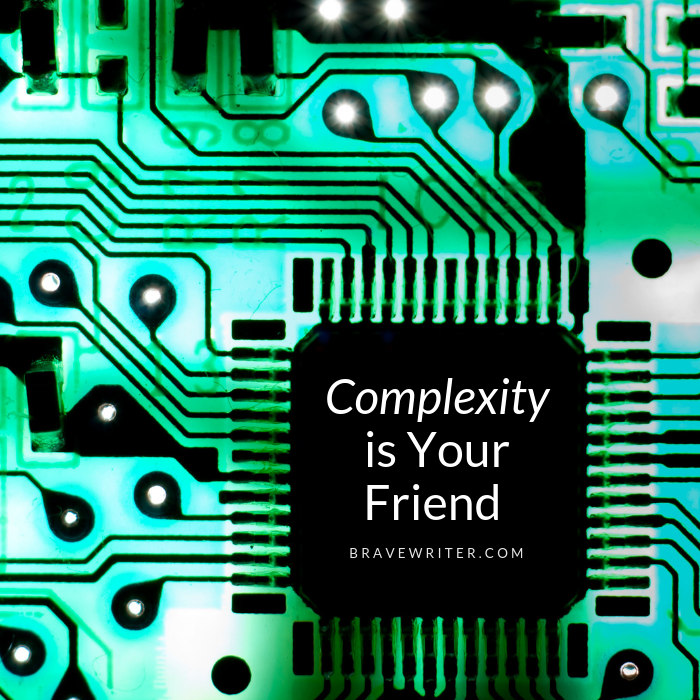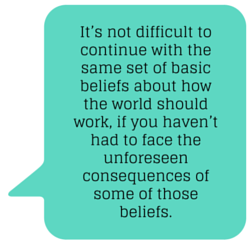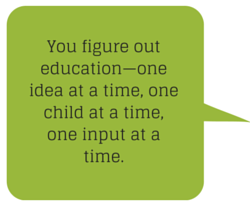Complexity is Your Friend

A while ago, I interacted with a friend who is childless and has never been married. She’s a wonderful person with a number of gifts, not the least of which is her career in banking where she is a skilled, talented, responsible manager of a branch (many people report to her and she does her job quite well). She is smart, a good leader, and a financial wizard. She is also a wonderful auntie and loyal friend.
We got to talking about our families of origin with a couple of my other friends (who had been married or were still, and who had homeschooled their kids). When an issue came up, this unmarried friend gave advice based on her experience of being an auntie and a daughter (both valid sources of information about family relationships, to be sure).
Sometimes her advice felt helpful but sometimes it felt out of tune. I was trying to put my finger on why.
Then she made a remarkable statement: “It always amazes me when someone says that they have changed their ideas about important issues—like how to parent or what they think of marriage or social and political issues. I’ve held the same views for as long as I can remember and I don’t imagine them ever changing. It seems like people would be much happier if they just stopped re-evaluating their beliefs all the time.”
And that’s when it hit me. Untested theories about life can remain peacefully in tact. If you aren’t married, it’s easy to have rules about what would end a relationship… until you are in a relationship with children at stake, intertwined incomes, and shared meaningful history. Suddenly your sense of what is a “deal breaker” can, and often does, change.
If you don’t have children of your own, enforcing a set of rules for etiquette, bedtimes, and schoolwork seems so reasonable, so easy to implement. Adults mis-remember their own childhoods all the time—they pretend to themselves that they liked their parents’ harsh rules or that they were made better people by the discipline of a school principle, or at the least, that whatever befell them wouldn’t have, had the adult authorities in their lives been more stringent or more involved or more kind or whatever.
 Likewise, it’s not difficult to continue with the same set of basic beliefs about how the world should work, if you haven’t had to face the unforeseen consequences of some of those beliefs, nor had them tested personally.
Likewise, it’s not difficult to continue with the same set of basic beliefs about how the world should work, if you haven’t had to face the unforeseen consequences of some of those beliefs, nor had them tested personally.
I say all this for a reason. This is not you. You do not have the luxury of a simple, satisfying worldview.
You are in the murkiest, most-life-testing context of life. When you sign up to have children, you are volunteering for a mental and emotional overhaul of all you thought you knew to be true. Your theories will now be tested. You will explore ideas and practices you didn’t believe in back when you knew everything.
Your need to “do it right” so nothing bad will happen to you or the people you love, will morph over time as hair-raising circumstances challenge you to reconsider. You’ll discover that “happily ever after” doesn’t exist for you (or anyone).
The competing needs for attention, affection, nutrition, and sleep between people sharing a household is of Olympic scale! Everyone goes all in, and there are clear winners and losers in each category every day. You’ll be pushed to your limits, which will then force you to figure out how to help everyone take better care of themselves a little bit at a time (including that spouse of yours, and yourself – the last one you usually manage to help).
It’s incredible, really, that anyone sharing a home for years on end keeps at it. Really. Truly. Does anyone sync up perfectly in terms of their needs? Married couples can hardly get on the same page about sex and finances—add a couple of kids with high energy, sleep disorders, bed wetting, learning disabilities, and allergies—well, the capacity to match up and have peace is out the window right there.
The Magical Silver Lining
But here’s the magical silver lining to the whole absurd “Get Everyone On the Same Page” project: you all grow. You grow and you grow and you grow. You have to. It’s the requirement of non-monastic life!
You figure out sleep—by sharing and caring and swapping who stays up late and who gets up tomorrow night and how you sleep (co-sleep or using cribs or putting a mattress on the floor in your bedroom for the one scared child who needs you every night). You stop shaming the bed wetter, you take more naps, you require days off, you start exercising and drinking chamomile tea. You keep at it until you get sleep. It might take years, but you work on it every day.
You figure out food—little snack trays, or low shelves with easy to open food stuffs, or six weeks of dinners made and frozen in a freezer, or crock pots, or take out Chinese every Friday night. You handle allergies and learn to cook. You read more books about food than you ever imagined needing to.
You figure out romance—the date night or the one candle that tells the spouse: Yep, I’m open to sexual contact tonight. You swap babysitting with the best friend to have the house alone once in a blue moon, or you read to your honey-bear every night before you sleep. You trade flirty texts throughout the day or you take a few months off postpartum so you don’t have to negotiate “Do you want to?” every night.
You figure out life—how to survive the overwhelming crushing disappointments that come from failed ideals (friends who betray you; religious communities that stumble; the marriage that can’t and shouldn’t make it; the illness you didn’t plan that robbed you for three years straight; the miscarriages; the house fire; the hurricane; the lost job, lost income, and home repossession; the embarrassment of gaining all that weight due to diabetes, after you had been a dancer in college; the heartache at having hurt your own child; the alcoholism or drug addiction that are destroying someone you love).
 In the same ways, you figure out education—one idea at a time, one child at a time, one input at a time. You keep revising your ideas, and then you find new ones that really click. But you know what works and doesn’t because you lived each one sincerely. You know your children—you keep letting them teach you about who they are, and that changes how you understand yourself, in addition to them.
In the same ways, you figure out education—one idea at a time, one child at a time, one input at a time. You keep revising your ideas, and then you find new ones that really click. But you know what works and doesn’t because you lived each one sincerely. You know your children—you keep letting them teach you about who they are, and that changes how you understand yourself, in addition to them.
Slowly you expand how you operate to accommodate other personality types than your own. You give up notions of phony perfection between parent and child. There is no tactic that ensures a child will match a parent’s fantasy of who he or she should be by 18. There is only love and trying, over and over and over again—until the child knows he or she is loved, and the parent knows that the child is irrefutably a unique worthy person wholly separate from either parent.
Creating a family is the most exasperating, philosophy-destroying, crash-course in love I know about.
No two families will get there the same way—but the end goal is a shared one (and a worthy one): to like each other as much as we love each other.
It takes a lifetime.
Complexity is your friend. It will make you into a humble, generous, open-minded, caring, attentive human being, if you let it.
Top image by Derek Gavey (cc cropped, text added)


















